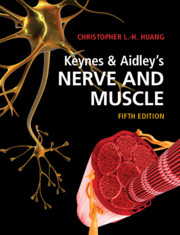Book contents
- Keynes & Aidley’s Nerve and Muscle
- Keynes & Aidley’s Nerve and Muscle
- Copyright page
- Dedication
- Contents
- Preface
- Acknowledgements
- Abbreviations used in the text
- 1 Structural Organisation of the Nervous System
- 2 Resting and Action Potentials
- 3 Background Ionic Homeostasis of Excitable Cells
- 4 Membrane Permeability Changes During Excitation
- 5 Voltage-Gated Ion Channels
- 6 Cable Theory and Saltatory Conduction
- 7 Neuromuscular Transmission
- 8 Synaptic Transmission in the Nervous System
- 9 The Mechanism of Contraction in Skeletal Muscle
- 10 The Activation of Skeletal Muscle
- 11 Excitation–Contraction Coupling in Skeletal Muscle
- 12 Contractile Function in Skeletal Muscle
- 13 Cardiac Muscle
- 14 Ion Channel Function and Cardiac Arrhythmogenesis
- 15 Smooth Muscle
- Further Reading
- References
- Index
11 - Excitation–Contraction Coupling in Skeletal Muscle
Published online by Cambridge University Press: 07 November 2020
- Keynes & Aidley’s Nerve and Muscle
- Keynes & Aidley’s Nerve and Muscle
- Copyright page
- Dedication
- Contents
- Preface
- Acknowledgements
- Abbreviations used in the text
- 1 Structural Organisation of the Nervous System
- 2 Resting and Action Potentials
- 3 Background Ionic Homeostasis of Excitable Cells
- 4 Membrane Permeability Changes During Excitation
- 5 Voltage-Gated Ion Channels
- 6 Cable Theory and Saltatory Conduction
- 7 Neuromuscular Transmission
- 8 Synaptic Transmission in the Nervous System
- 9 The Mechanism of Contraction in Skeletal Muscle
- 10 The Activation of Skeletal Muscle
- 11 Excitation–Contraction Coupling in Skeletal Muscle
- 12 Contractile Function in Skeletal Muscle
- 13 Cardiac Muscle
- 14 Ion Channel Function and Cardiac Arrhythmogenesis
- 15 Smooth Muscle
- Further Reading
- References
- Index
Summary
Excitation-contraction coupling refers to the events connecting surface membrane excitation and initiation of mechanical activity. It involves a steeply voltage-dependent Ca2+ release from its intracellular sarcoplasmic reticular store. The resulting cytosolic Ca2+ elevation, leading to troponin activation, is detectable through absorbance or fluorescence properties of intracellularly introduced optically sensitive dyes. The initiating transverse tubular depolarisation is sensed by intramembrane dihydropyridine receptors at triad junctions with terminal cisternal sarcoplasmic reticulum. Their underlying configurational changes were demonstrated and characterised through their associated intramembrane charge movements employing pharmacological agents known to modify excitation-contraction coupling. This separated a steeply voltage-dependent qγ transition allosterically and co-operatively coupled to opening of sarcoplasmic reticular ryanodine receptor Ca2+ release channels. These events and the associated Ca2+ release reverse with membrane repolarisation. Sarcoplasmic reticular Ca2+-ATPase activity then returns the released Ca2+ from cytosol to its sarcoplasmic reticular store. Clinical ryanodine receptor disorders cause malignant hyperthermia, important in anaesthetic practice.
Keywords
- Type
- Chapter
- Information
- Keynes & Aidley's Nerve and Muscle , pp. 154 - 179Publisher: Cambridge University PressPrint publication year: 2020

